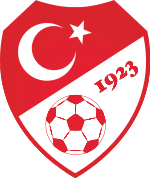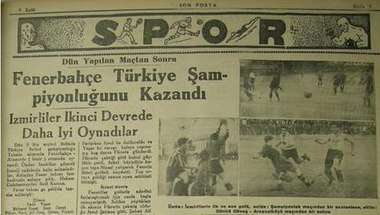Turkish Football Federation
| UEFA | |
|---|---|
 | |
| Founded | 1923 |
| FIFA affiliation | 1923 |
| UEFA affiliation | 1962 |
| President | Yıldırım Demirören[1] |
| Website |
www |
The Turkish Football Federation (TFF, Turkish: Türkiye Futbol Federasyonu) is the governing body of association football in Turkey. It was formed on 23 April 1923, and joined FIFA the same year and UEFA in 1962. It organizes the Turkish national teams, the Turkish Football League and the Turkish Cup.
Turkish football league system
The Turkish football league system is divided into eight tiers, ranging from the top-tier Süper Lig to local amateur divisions.
Turkish Cup
The Turkish Cup changed its name to the Federation Cup (Turkish: Federasyon Kupası) in the 1980–81 season, then back to Turkish Cup in 1992–93.
Controversial denial of former national championships

The TFF organized a nationwide championship as early as 1924. That year the Turkish Football Championship (Turkish: Türkiye Futbol Şampiyonası) was held in order to bring forth a national football champion.[2][3] The championship format was based on a knockout competition, contested between the winners of each of the country's regional leagues. Some years later, in 1937, the first national league called Millî Küme was introduced. The league was held until 1950, one year before the Turkish Football Championship was also abolished.[4][5]
Even though both competitions were organized by the TFF and were official championships respectively,[6][7] they are not acknowledged and counted by the very same federation which held them. Until today no official reason or motive was given for the unparalleled and irregular denial. All other football associations in Europe without exception consequently acknowledge their former national championships. The Turkish Federation is the only one with such a stance.
As a result, Ankara Demirspor became the first club to officially demand the federation to acknowledge their championship title won in those decades, but received no answer at all to date.[8] Club president Nuğman Yavuz stated that he contacted the Turkish Federation twice, but the federation did not respond in any way.[9] Similarly, Fenerbahçe also requested proper acknowledgement of these national championship titles, and faced the same unconstructive reaction.[10] Having won a total of nine titles in both former championships, the club demands to have those official titles rightfully acknowledged.[11][12][13][14]
The lack of comprehension and awareness concerning the baseless denial of proper championship titles is growing in the general Turkish public and among Turkish sports people. For instance, Mehmet Demirkol, a renowned sports writer and commentator, stated that Beşiktaş won their 20th championship title overall in the 2016–17 season, not their 15th.[15][16][Video 1] Numerous other sports writers, persons of authority, politicians, and officials also openly expressed their opinions on this issue and reinforced the view that the Turkish federation should unambiguously acknowledge and count the former championship titles.[17][18][19][20][21][Video 2][Video 3]
Hosting bids
.jpg)
Turkey has had several unsuccessful bids to host the UEFA European Championship.
Turkey submitted a joint bid with Greece for UEFA Euro 2008, which failed. Their bid for UEFA Euro 2012 was also unsuccessful, with the competition going to Poland and Ukraine. The federation also submitted a bid to host UEFA Euro 2016, but on May 28, 2010, UEFA announced that Euro 2016 would be hosted by France. France beat bids of Turkey (7-6 in voting in second voting round) and Italy, which had the least votes in first voting round. Turkey were also bidding for UEFA Euro 2024, competing against Germany. Germany were announced the hosts on September 27, 2018 at the UEFA headquarters in Nyon, Switzerland.
Turkey had already hosted the 2005 UEFA Champions League Final and the 2009 UEFA Cup Final in Istanbul.[22] At the youth-level, they hosted the UEFA European Under-17 Football Championship in 2008, after first hosting the event back in 1993.
See also
References
- ↑ Ata, Ercan (27 February 2012). "Türk futbolunun 41. başkanı Yıldırım Demirören". Hürriyet (in Turkish). Retrieved 27 February 2012.
- ↑ "Türkiye Futbol Birinciliği". Erdinç Sivritepe. Archived from the original on 20 January 2018. Retrieved 13 December 2017.
- ↑ "Türkiye Futbol Federasyonu Kuruluyor". tff.org (in Turkish). Turkish Football Federation. Archived from the original on 25 January 2018. Retrieved 13 December 2017.
1936'ya kadar süren bu dönemde ilk Türkiye Şampiyonası Ankara'da yapılmış ve şampiyon Harbiye olmuştur.
- ↑ "Milli Küme". Erdinç Sivritepe. Archived from the original on 26 October 2017. Retrieved 13 December 2017.
- ↑ "Türkiye Futbol Federasyonu Kuruluyor". tff.org (in Turkish). Turkish Football Federation. Archived from the original on 25 January 2018. Retrieved 13 December 2017.
...ilk deplasmanlı lig kapsamındaki Milli Küme maçları da yine bu dönemde tertip edilmiştir.
- ↑ "Turkey – List of Champions". rsssf.com. RSSSF. Archived from the original on 26 September 2018. Retrieved 14 April 2018.
- ↑ "First National League and Cup Competitions and a Super Cup". Erdinç Sivritepe. Archived from the original on 27 May 2018. Retrieved 13 December 2017.
- ↑ "65 yıl sonra, şampiyonluğunun peşinde" (in Turkish). Hürriyet. Retrieved 13 December 2017.
- ↑ "Ankara Demirspor şampiyonluğunu istiyor". haber7.com (in Turkish). Archived from the original on 14 December 2017. Retrieved 13 December 2017.
- ↑ "F.Bahçe, 9 şampiyonluğunu istiyor". sporx.com (in Turkish). Archived from the original on 20 January 2018. Retrieved 13 December 2017.
- ↑ "G.Birliği ve A.Gücü Şampiyon Oluyor". sporyolu.com (in Turkish). Archived from the original on 27 May 2018. Retrieved 27 May 2018.
- ↑ "Fenerbahçe 1959 öncesi için çalışma başlattı". ntvspor.net (in Turkish). NTV Spor. Archived from the original on 14 April 2018. Retrieved 14 April 2018.
- ↑ "Fenerbahçe 5. yıldızı istiyor". hurriyet.com.tr (in Turkish). Hürriyet. Archived from the original on 14 December 2017. Retrieved 13 December 2017.
- ↑ "19 değil, 28 şampiyonluk". trthaber.com (in Turkish). TRT Haber. Archived from the original on 22 November 2017. Retrieved 13 December 2017.
- ↑ "Mehmet Demirkol: Beşiktaş'ın 20. şampiyonluğu bu". kralspor.ensonhaber.com (in Turkish). En Son Haber. Archived from the original on 14 December 2017. Retrieved 14 December 2017.
- ↑ "Mehmet Demirkol: Beşiktaş'ın 20 şampiyonluğu var!". fanatik.com.tr (in Turkish). Fanatik. Archived from the original on 14 December 2017. Retrieved 14 December 2017.
- ↑ "1959'dan önceki şampiyonluklar nerede?". hurriyet.com.tr (in Turkish). Ali Can Yaycılı. Archived from the original on 26 December 2017. Retrieved 25 December 2017.
- ↑ "19 değil 28 şampiyonluk kanıtlarla". sporyazarlari.com (in Turkish). Metin Sipahioğlu. Archived from the original on 23 August 2017. Retrieved 14 December 2017.
- ↑ "Futbolumuzun miladı; takımların gerçek şampiyonluk sayıları nedir?". milliyet.com.tr (in Turkish). Uzay Gökerman. Retrieved 14 December 2017.
- ↑ "Ben, "28." diyorum…". hurriyet.com.tr (in Turkish). Ateş Bakan. Retrieved 14 December 2017.
- ↑ "FENERBAHÇE'NİN KAÇ ŞAMPİYONLUĞU VAR ??". abcspor.com (in Turkish). Burak Belgen. Retrieved 14 December 2017.
- ↑ "BBC: Man City stadium given Uefa final". BBC News. 4 October 2006. Retrieved 6 January 2010.
- Video references
- ↑ Mehmet Demirkol: Beşiktaş'ın 20 şampiyonluğu vardır. 15 falan değil! (YouTube video) (in Turkish). Retrieved 14 December 2017.
- ↑ 1959 Öncesi Şampiyonluklar Sayılmalı Mı? Emre Bol ve Turgay Demir Yorumları (YouTube video) (in Turkish). Retrieved 22 April 2018.
- ↑ '28 şampiyonluk' için resmi başvuru (YouTube video) (in Turkish). Retrieved 25 December 2017.
External links
![]()
- Official website (in Turkish)
- Turkish soccer
- Amateur Football in Turkey
- Turkey at FIFA site
- Turkey at UEFA site

